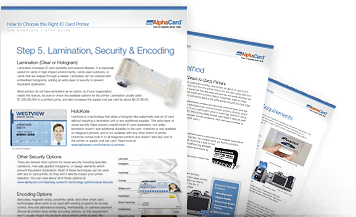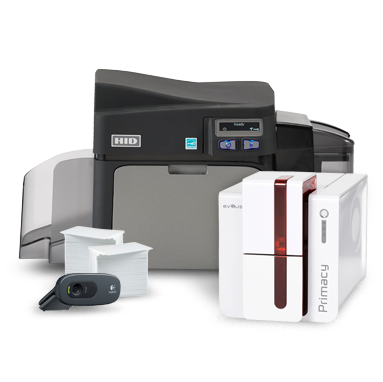Complete ID card systems contain a wide variety of parts, from ID card printers and supplies to design software and card accessories. This section will help you understand the many options you have so you can confidently pick an ID card system.

ID Card Printers
ID card printers are at the center of every ID card system. These printers have a wide variety of options so you can select the printer that best matches your organization’s needs for employee badges, visitor passes, multipurpose cards, and more.

Single-Sided vs Dual-Sided Printing
Single-sided printers print on the front side of the card only, while dual-sided printers allow you to print on both sides of the card.

Dye Sublimation vs Reverse Transfer Printing
ID card printers use a ribbon to print, but there are two different types of technologies for the printing process, both with their own advantages.

Single-Feed vs Batch Printing
While single-feed printers allow you to easily print a card or two on demand, batch printing makes it easy to print multiple cards at once.

Rewritable Printers
An option on some ID card printers, rewritable printers use temperature sensitive cards that can be printed & rewritten.

Laminating Printers
An upgrade option on many ID card printers, lamination adds an extra layer of protection and security to your ID cards.

Encoding Printers
If your card program needs multifunctional ID cards, there are many options for encoding from basic barcodes to smart cards.

USB, Ethernet & WiFi Connectivity
With three computer to printer connection types to choose, you can choose the connection type that best suits your office and card printing needs.

ID Cards
ID cards are used for everything from basic photo IDs for students and staff at schools to advanced multifunctional cards that unlock doors and pay for parking. The different types of cardstock have unique uses, from standard ID cards to smart cards.

ID Card Material
ID cards are made from a wide variety of materials, from basic PVC cards to recycled plastics and PVC/Poly composite cards for lamination.

ID Card Sizes and Dimensions
From the standard CR80 cards to larger CR100 cards, your ID card program can choose from a variety of ID card sizes.

Color ID Cards
Blank ID cards are available in a wide range of colors including florescent and metallic. It is recommended you only print monochrome designs.

Rewritable ID Cards
Made from heat-sensitive materials, rewritable ID cards can be printed, wiped clear, and printed again up to 500 times per card.

Encoded ID Cards
When it comes to multifunctional ID cards you have many choices, from magnetic stripe cards to contact and contactless smart cards.

Printer Ribbons
ID card printers use special ribbons to print card designs. Unlike a traditional desktop inkjet printer, which uses liquid ink, these ribbons are solid until heat is applied during the printing process. There are many types of ribbons, from multi-colored to monochrome.
-
Different Types of Ribbons
Standard Ribbons YMCKO, YMCKT Yellow (Y), Magenta (M), Cyan (C), Black (K), Overlay/Topcoat (O/T). This is the standard full color ribbon for single-sided ID card printing. This ribbon will print images in full color and text in black, with a clear overlay. If used for dual-sided printing, the card yield is cut in half. YMCKOK [...]
-

Encoding Options
There are several ways to encode cards, each designed to hold a different style or amount of data – selecting the best encoding method for your ID cards really depends on how you will use the cards.

Barcode Encoding
Barcodes are the most common type of encoding used with ID cards, from retail membership programs to cashless payment systems at schools.

Magnetic Stripe Encoding
Requiring specialized cards and a printer upgrade, magnetic stripe encoding is more expensive but offers more flexibility than barcodes.

Smart Card & RFID Encoding
An advanced form of encoding, smart cards and RFID cards use chips or wireless antennas to send card data to the card reader.

Proximity Card Encoding
Proximity cards, a type of smart card, are used for access control to unlock doors without the use of a traditional key system.

Visual Security
Adding visual security elements to your ID cards will make it easier to identify authentic cards and help prevent card tampering or illegal duplication. See the different ways you can add security with your printer, printing options, or blank cards.

Printer Options
If secure cards are a key feature of your ID card program, look for printers with features specifically designed for security including lamination and high definition printing.

Ribbon Options
To print some security features, you may require a specialized printer ribbon. This can include UV and fluorescent ribbons, clear lamination film, or lamination with holograms.

Card Options
Specialized visual security blank cardstock comes with a range of features included in the cards such as foil and metallic patches, holograms, and foil patches with holograms.

Why You Can’t Print Fake IDs with an AlphaCard Printer
Government-issued ID cards have many visual security features built into the cardstock and the card design. Card printer available from AlphaCard cannot replicate these IDs.

Cleaning Kits
Cleaning your ID card printer is the key to keeping it running in top shape for years to come. This helps remove the dust and debris that can build up and damage the printer, sensors, rollers, or printhead.




